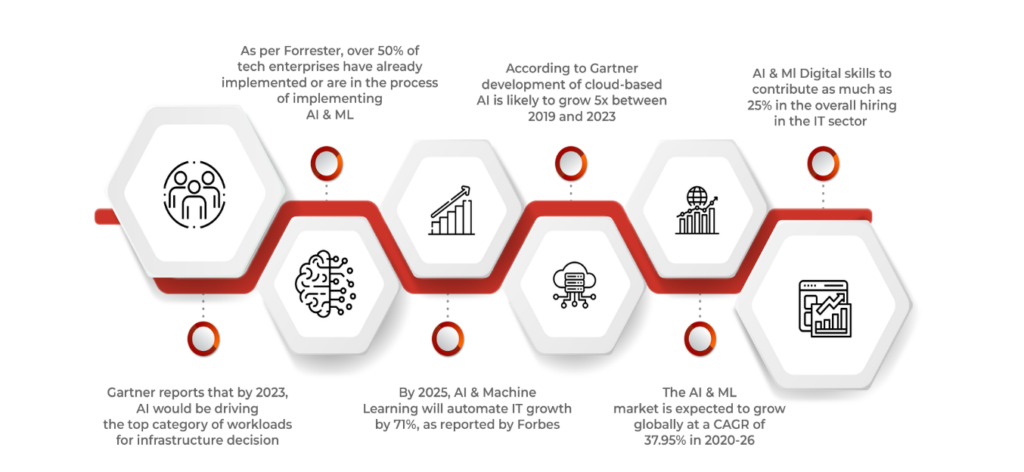Diploma in Artificial Intelligence (AI)
and Machine Learning (ML)
About This Program
The demand for AI-enabled automation is rapidly increasing, with a forecast by Markets and Markets
predicting that the market will grow from USD 58.3 billion in 2021 to USD 309.6 billion by 2026, at a
CAGR of 39.7% globally. With the Indian government’s focus on digitization and many organizations accelerating their digital transformation efforts, the demand for AI talent is expected to surge in
India as well.
Regardless, it is evident that AI and ML are rapidly transforming industries and businesses across the
globe. In India, the government’s push for digitization and the growing adoption of digital
technologies by organizations are driving the demand for skilled AI professionals.
To meet this demand, the Nextgen Education Foundation has launched an 11-month online Diploma
in Artificial Intelligence and Machine Learning program. This program aims to equip working
professionals with a deep understanding of AI and its various applications, as well as the necessary
skills to succeed in this dynamic field. The program is designed to be up-to-date with the latest
industry trends and can help individuals prepare for the future of work in the AI and ML industry.
Artificial Intelligence (AI) and Machine Learning program (ML)- Stepping Stone to the Future

Eligibility:
- Employed professionals holding BE/ B.Tech. or equivalent, and working in relevant fields are eligible to apply.
- Candidates holding M.Sc. in Mathematics or Statistics, and working in relevant roles are also eligible to apply to this programme.
- A working knowledge of languages such as Python is recommended.
Selection Criteria:
Strictly based on the merit, written test and personal Interview.
Examination:
Highlights:
- 11-month Post Graduate certificate programme for working professionals that can be pursued online.
- Comprehensive and rigorous curriculum covering key concepts and technologies of Artificial Intelligence and Machine Learning.
- An 8-week Capstone project where you will work towards solving a Data Science related business problem under the mentorship of Nextgen Education Foundation faculty members and senior industry practitioners.
- Two Immersion modules of 2-days each at a Nextgen Education Foundation.
- Access to Nextgen Education Foundation instructors through online live lectures, Q&A support and discussion forums.
- Participants who successfully complete the programme will become members of an elite & global community of Nextgen Education Foundation Alumni.
- Contact-less and safe Online exams facility.
- Option to submit fee using easy-EMIs with 0% interest.
Program Outline:
The 11-month online Diploma in Artificial Intelligence and Machine Learning consists of 6 Courses and a Capstone Project.
Regression is a widely used statistical learning method, and this course will enable participants to have a deeper understanding of regression models both from theoretical and implementation perspective.
The course covers concepts such as lasso regression, ridge regression and the interpretability of the predicted models.
Overview of certificate programme in ML & Introduction to Regression Mathematics Foundations Model Building using Least squares Model Accuracy & Selection Over fitting Interpretability of regression models
Feature Engineering is an important step to develop and improve performance of Machine Learning models. In this course, students will learn different data wrangling techniques that help transforming the raw data to an appropriate form on which learning algorithms can be applied.
This course enables students to identify and implement appropriate feature extraction and pre-processing techniques. The Visualization techniques will also be taught in this course.
Overview of Feature Engineering Data Pre-processing Dimensionality Reduction Visualization
The course on Classification lays down a strong foundation on the algorithmic perspective of popular classification algorithms - k-NN, Naïve Bayes, Decision Tree, Logistic Regression and SVM. The implementation details of these models along with tuning of parameters will be illustrated. The course also covers concepts such as ensemble methods like bagging, boosting, Random Forest, and interpretability of the predicted models.
Overview of the Classification ModuleNearest-neighbour MethodsNaïve Bayes ClassifierLogistic RegressionDecision TreeOptimization Foundations for Support Vector MachinesSupport Vector MachinesSupport Vector Machines in overlapping class distributions & KernelsEnsemble Methods
The course on Unsupervised Learning & Association Rule Mining focuses in finding natural groups or clusters that are present in the data. The course will cover lustering algorithms like K-means, Hierarchical & DBSCAN algorithms, Hidden Markov Models for time series prediction, and market basket analysis to generate the interesting rules from a transactional database.
Introduction to Unsupervised Learning, ClusteringK-Means Algorithm, K-Means – Variations, Detecting OutliersMath Fundamentals for EM Algorithm, EM Algorithm, Clustering for Customer SegmentationHierarchical ClusteringDensity Based Clustering, Clustering for Anomaly DetectionAssessing Quality of Clustering, Significance of Clustering - Interpreting/ summarizing Clusters by businessesAssociation Rule Mining, Apriori AlgorithmTime series Prediction and Markov Process, Hidden Markov Model
Text mining is the process of deriving high-quality information from text and this is the fifth course of the program. This course aims to equip students with adequate knowledge in extracting the relevant text data and skills to identify patterns therein. This course covers topics like converting documents to vectors, Parts of Speech Tagging, Topic modelling, sentiment analysis and recommender systems.
Document vectorization and Parts of Speech TaggingIntroduction to Part of speech tagging, Part of speech tagging using HMM-1, Implementing POS Tagging in PythonTopic modelling using LDAIntroduction to Sentiment AnalysisRecommender Systems
Deep learning is an evolving subfield of Machine Learning and this course starts with traditional Neural Networks followed by sequential networks, Convolution Networks, Autoencoders and Generative deep learning models. The implementation details of these deep learning models along with tuning of the parameters will be illustrated in this course.
Artificial Neural Network Sequence Modeling in Neural Network Deep Learning Convolution Networks with Deep Learning Autoencoders with Deep Learning Generative deep learning models
During the 8-week Capstone Project, participants will work in teams to design and solve a real-world business problem encompassing data science pipeline using AI&ML techniques under the mentorship of Nextgen Education Foundation faculty members and senior Industry practitioners.
In addition to the Curriculum above, participants will have the option of taking an optional course on Python at the beginning of the Programme. This will allow participants to revisit essential concepts that will help in all other courses during the programme. Topics covered include Introduction to Python programming and installation, Data Types, Program constructs, Numpy, Pandas, Matplotlib, and Debugging python programs.
Duration
11 Months
This Course Include
- 11-month Post Graduate certificate programme for working professionals that can be pursued online.
- Two Immersion modules of 2-days each at a Nextgen Education Foundation.
- Contact-less and safe Online exams facility.
- Option to submit fee using easy-EMIs with 0% interest.
Enquire Now
Industry Collaboration & Placements
+91 - 86240 65100
enquiry@nextgenedu.in
